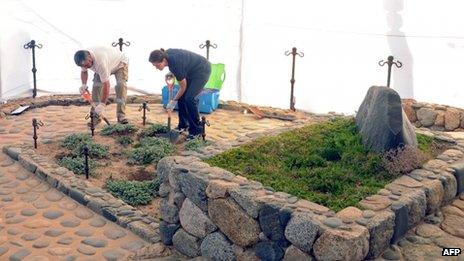Pablo Neruda: Chile exhumes poet's body in murder probe
- Published

Members of Chile's Medical Legal Service dig up the grave in Isla Negra
Forensic experts in Chile have exhumed the remains of the poet, Pablo Neruda, who died in 1973.
The Chilean authorities want to establish whether he died of cancer or was poisoned on the orders of Chile's military ruler, Gen Augusto Pinochet.
Pablo Neruda, a Nobel Prize winner, was a member of the Communist Party and a staunch supporter of ousted Chilean President Salvador Allende.
Neruda died aged 69 just 12 days after Gen Pinochet's coup against Allende.
The head of Chile's Medical Legal Service, Patricio Bustos, said the poet's body was exhumed in about an hour on Monday and tests will be carried out on his remains in the capital, Santiago.
Neruda was buried next to his wife Matilde Urrutia in the garden of their home on the Pacific coast of Chile in Isla Negra, some 120km (75 miles) west of Santiago.
His family maintains that he died of advanced prostate cancer.
'Suspicious injection'
In 2011, Chile started investigating allegations by his former driver and personal assistant, Manuel Araya, that Neruda had been poisoned.
Mr Araya says Neruda called him from hospital, and told him he was feeling sick after having been given an injection in the stomach.
Pablo Neruda had planned to go into exile in Mexico
The allegations are backed by the Chilean Communist Party, which says that Neruda did not exhibit any of the symptoms associated with the advanced cancer he is reported to have died of.
A nephew of Neruda, Rodolfo Reyes, said the family wanted to know the truth "regardless of whether he died of natural causes or was murdered".
Neruda, best known for his love poems, was a close friend of Salvador Allende.
After Allende was toppled in the 11 September 1973 coup, the poet arranged to go into exile in Mexico, where he was expected to join the opposition to the military rule of Gen Pinochet.
Historian Francisco Marin is one of those who thinks Neruda's plans to go abroad, and his sudden death, were linked.
"No-one doubts that there was a plane waiting for Pablo Neruda at Pudahuel airport when he died," according to Mr Marin.
"He had a urinary infection and an adenoma [benign tumour] on his prostate, according to the medical tests, but he wasn't going to die," Mr Marin told Reuters news agency.
More than 3,000 people were "disappeared" and killed under the 17 years of Gen Pinochet's military rule (1973-90).
- Published8 April 2013
- Published21 March 2013
- Published13 March 2013